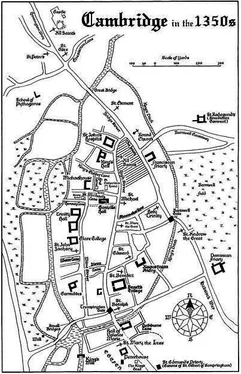‘The weather is determined by God,’ corrected Suttone severely. ‘Is that not so, Kenyngham?’
‘You just said it was caused by the plague,’ countered Bartholomew immediately.
‘Gentlemen, gentlemen,’ said Langelee mildly. ‘You can save this sort of thing for the debating halls. And you are all wrong, anyway. In the words of Aristotle, both the plague and the bad weather are things that just happen, and no amount of reasoning and philosophising will help us understand why.’
‘Those do not sound like Aristotle’s sentiments to me,’ said Bartholomew, feeling that Langelee was seriously mistaken. ‘He was a philosopher, and his life was spent speculating about things that have no obvious explanation. He never claimed that because there was no immediate answer we should not try to think of some.’
‘He did other things, too,’ said Langelee, enigmatically vague. ‘But I do not have time to teach you about them now. Here we are at the church. Silence, if you please.’
Having had the last word, he led his scholars inside St Michael’s, where the temperature was even lower than the frigid chill of outside. As the first glimmers of sunlight filtered through the windows, dulling the gleam of gold from the candles, the ceremony began.
Shepherd’s Mass was an important event, and the church was full. The scholars from Ovyng, Physwick, St Catherine’s and Garrett hostels were there, along with the folk who lived in the parish of St Michael. These were a mixed bag, ranging from the families who occupied the seedy shacks that lined the river, to some of the wealthiest merchants in the town. Since benches were provided only for the old or sick, the rest of the parishioners were obliged to stand together in the nave.
Obvious barriers were apparent. The rich were at the front, where they could see what was happening; their servants stood behind them, forming a human wall to prevent them from coming into contact with the rabble who massed at the back of the church. With some trepidation, Bartholomew looked for Philippa, but she was not there. He did not know whether to be disappointed or relieved.
Sheriff Morice stood near the rood screen. He looked smug and affluent, and a redness in his cheeks suggested that he had not bothered to wait for the end of mass before imbibing a little breakfast ale to drive away the chill of early morning. By contrast, the folk from the riverbank huts were pinched and white, some with a cadaverous look that indicated starvation might well claim them before winter relinquished its hold.
Although the men, women and children at the rear of the building were jammed elbow to elbow and scarcely had room to stand, one member of the congregation had plenty of space. This was Robin of Grantchester, the town’s surgeon. He was short and slightly hunched, with dark, greasy hair and a mournful expression that did little to inspire confidence in those unfortunate enough to fall prey to his dubious skills. His clothes were caked in old blood, none of it his own, while the knife bag he carried at his side clanked ominously with his every movement.
Halfway through a psalm, Bartholomew became aware that Michael had stopped chanting, and was glowering towards the nave with an expression that caused more than one person to shift uneasily. However, the real object of his glare was blissfully unaware that if looks could kill then his soul would already be well on its way to the next life. Harysone was present, holding a wide-brimmed hat in his hands and looking very imposing in his black cloak and matching gipon. Bartholomew could see the pale gleam of his long teeth from the chancel, and was reminded of one of the mean-eyed rats that lived near the river.
‘What does he want?’ hissed Michael venomously. ‘He has no right to be here.’
‘He has every right to be here,’ whispered Bartholomew. ‘He is doing nothing wrong.’
‘He has come to see whether we have discovered the man he killed,’ determined Michael. ‘Look! He keeps glancing across at the albs.’
‘Actually,’ said Bartholomew, for the first time fully appreciating why the monk detested Harysone so, ‘he is looking at Matilde.’
Matilde, unofficial leader of the town’s prostitutes, was the most attractive woman in Cambridge, as far as Bartholomew was concerned. Possessing a natural beauty that needed no potions or pastes to enhance it, her hair always shone with health and her face was pure and unblemished, like an alabaster saint’s. Men had been complaining for years now that they had been unable to secure her personal services, and it appeared that she had abandoned her life of merry pleasure among those wealthy enough to afford her, to devote her time to the town’s women – prostitutes or downtrodden, homeless or afraid.
That morning, she wore her best blue cloak, which caught the mysterious colours in her eyes and made them even more arresting than usual. Her dress was cut close in the latest fashion, revealing her slender, lithe body, and the way Harysone was ogling her with his moist, glittering eyes made the physician want to march down the aisle and punch him.
But Bartholomew was not Matilde’s only friend present that morning. The physician saw Harysone crane backward, then forward, then fold his arms with a sullen expression. Several of Matilde’s ‘Frail Sisters’ had clustered around, shielding her from Harysone’s lascivious gaze. Moments later a couple of their menfolk began to jostle the unwelcome visitor. Finding himself crowded between a rough bargeman and a burly carpenter, Harysone took a step towards the porch. Carpenter and bargeman followed, until Harysone had been neatly herded to the door. Yolande de Blaston, the carpenter’s wife, just happened to open it and, with a nudge from one of her sturdy elbows, Harysone was gone.
‘Good,’ said Michael with satisfaction. ‘Now I can concentrate on my prayers.’
Bartholomew said nothing, although he felt enormous relief that Matilde had been rescued from the man’s open lust. He glanced at her, and saw that she was wholly unaware of the service that had just been performed on her behalf; her attention was fixed devoutly on the altar.
Eventually, it was time for Michael’s choir to make its appearance. Bartholomew knew that the monk had been practising with his motley collection of singers for weeks, and that improvement had occurred with frustrating slowness. Most enrolled only because Michaelhouse provided free ale and bread after services, and the applicants’ musical ability was never considered. Despite his bluster and sharp tongue, Michael was a compassionate man, who declined to refuse membership to the desperate souls for whom choir was the only way of ensuring a regular meal. Consequently, it was the largest body of singers in Cambridge, and had a reputation for volume.
It comprised men and boys from the poorest houses in the town, with a smattering of scholars to justify its name of the Michaelhouse Choir. The tenors included Dunstan and Athelbald, Bartholomew’s riverside patients, although Dunstan was too ill to be present that day. Among the basses were Isnard the bargeman and Robert de Blaston the carpenter, who had removed Harysone from the church.
While Kenyngham and Suttone muttered sacred words and moved sacred vessels, Michael’s choir took deep breaths to provide a little entertainment for the watching scholars and townsfolk. As they girded themselves up for music, a murmur of nervous apprehension rippled through the congregation.
Before people could think of leaving, Michael raised his arms and the sound began. A boy’s voice broke the silence, singing the vox principalis high and clear, so that the notes soaring around the rafters seemed to come from the throat of an angel. The boy was joined by a vox organalis , and the voices fluted and wrapped around each other, producing a harmony that was exquisite. The congregation exchanged glances of startled pleasure, and Bartholomew saw Michael look pleased with himself. The two singers were Clippesby and the Franciscan novice Ulfrid, and Bartholomew felt a surge of pride that Michaelhouse should possess such talent.
Читать дальше












